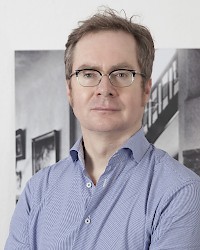Vita
Hans-Christian von Herrmann, born 1963, has been Professor of Literary Studies (Literature and Science) at Technische Universität Berlin since 2011. Having studied german philology, theatre studies and art history at Freie Universität Berlin, von Herrmann received his Ph.D. in 1995 at Ruhr-Universität Bochum with a dissertation on Brecht’s aesthetics of media. He worked as Scientific Assistant at Universität Leipzig from 1996 to 2000, where he also was habilitated in 2003. As Scientific Collaborator von Herrmann was associated to the Zentrum für Literaturforschung in Berlin until 2002. Over the following two years he worked as Visiting Professor of Communication Theory and Media Studies at Universität Duisburg-Essen. From 2004 to 2010, Hans-Christian von Herrmann was Substitute Professor in Jena, became appointed Visiting Professor at Princeton University and at New York University. From 2010 to 2011 he was Substitute Professor of cultural theory and cultural methods at Universität Konstanz.
Dated from 2016
Fields of research
Cultural science and technology studies; theory and history of digital media cultures; science and media history of art, literature and theatre.
IKKM Research Project
The planetary scale of technology
At the end of his 1928 book Einbahnstraße Walter Benjamin addresses a fundamental change of essence for the realm of science in modern culture. What he observes is the advent of a new kind of technology which can’t be considered anymore as the instrument of a scientific mastery of nature but as a mode of communication with the cosmos (or physis). The term, Benjamins puts into play here, is „the planetary scale of technology“ („der planetarische Maßstab der Technik“), which, as he underlines, puts an end to the nationalized and genealogical principles of human existence and indicates a future humanity living in a totally synthetic environment. What the messianic marxist Benjamin embraces here is a concept which arouse during the 1920s in Weimar Germany (Hans Freyer, Ernst Jünger, Martin Heidegger) and which can still be found in present-day discussions (Gilles Deleuze, Gayatri Chakravorti Spivak, Ulrike Bergermann). In reference to Hans Blumenberg it can be called an „absolute metaphor“, which means a provisional leap of thinking towards an unknown historical constellation. According to this metaphorical character „planetarity“ is closely related to the image of planet earth seen from a distance (from moon or from space). The genesis of this image can be traced back at least to Nietzsche’s philosophy which talks about earth as a body lost in the cosmic becoming and passing away of solar systems. When space travel during the 1960s made this rhetoric move photographically real it quickly became the emblematic image of our „planetary“ age (Stewart Brand: Whole Earth Catalogue, 1968/69). So the subject matter of this project outline is a double history of theoretical concepts and material objects and practices. It relates a series of philosophical texts with the history of knowledge and the history of technology in order to explore the radical cultural change as it is expressed under the heading „planetarity“.
Publications
Monographs
Literatur und Entropie. Berlin: Duncker & Humboldt 2014.
Das Archiv der Bühne. Eine Archäologie des Theaters und seiner Wissenschaft. München: Fink 2005.
Sang der Maschinen. Brechts Medienästhetik. München: Fink 1996.
Edited Books
with Wladimir Velminski: Maschinentheorien – Theoriemaschinen. Bern: Peter Lang 2012.
with Wladimir Velminski: Aleksej K. Gastev. Poesie des Hammerschlags. Ausgewählte Schriften 1916 – 1936. Berlin: Kadmos 2010.
with Barbara Büscher and Christoph Hoffmann (eds.): Ästhetik als Programm. Max Bense/Daten und Streuungen. Zürich: Diaphanes 2004.
with Helmar Schramm et al.: Körper des Bühnen des Wissens. Interferenzen zwischen Wissenschaft und Kunst. Berlin: Dahlem University Press 2003.
with Barbara Büscher, Christoph Hoffmann and Anke te Heesen (eds.): Cut & Paste um 1900. Der Zeitungsausschnitt in den Wissenschaften. Zürich: Diaphanes 2002.
with Matthias Middell: Orte der Kulturwissenschaft. 5 Vorträge. Leipzig: Leipziger Universitätsverlag 1998.
Articles
“Dämonie der Technik. Max Benses Geistesgeschichte der Mathematik”. In: Lars Friedrich, Eva Geulen, Kirk Wetters (eds.): Das Dämonische. Schicksale einer Kategorie der Zweideutigkeit nach Goethe. Paderborn: Fink 2014, pp. 363-372.
“Künstliche Kunst. Abstraktion als Mimesis”. In: Thorsten Bothe and Robert Suter (eds.): Prekäre Bilder. München: Fink 2010, pp. 225-246.
“Hitchcok’s Truth, or: Why ‘The Wrong Man’ is not a suspense film”, in: Paul Mladek (ed.): Police Forces: A Cultural History of an Institution. Palgrave McMillan, Nee York 2007, pp. 167-178.
“Das Leben in die Regie nehmen. Übergänge zwischen Klinik, Labor und Theater um 1900”. In: Max-Planck-Institut für Wissenschaftsgeschichte (ed.): Experimental Cultures: Configurations between Science, Art, and Technology, 1830-1950. Berlin: Max-Planck-Institut für Wissenschaftsgeschichte 2002, pp. 51-63.
“Sinnliche Gewißheit. Zur Psychophysik der Phantasie bei Wilhelm Dilthey und Wilhelm Scherer”. In: Cornelius Brock and Arnim Schäfer (eds.): Psychographien. Zürch/Berlin: Diaphanes 2006, pp. 267-277.
“Sensing Spaces. James Turrells helle Kammern”. In: Helmar Schramm et al. (eds.): Bühnen des Wissens. Interferenzen zwischen Wissenschaft und Kunst. Berlin: Dahlem University Press 2003, pp. 339-365.
